Formulating Monetary Policies to Control Inflation and Foster Economic Growth
VerifiedAdded on 2019/12/03
|10
|4056
|218
Report
AI Summary
The assignment content emphasizes the importance of governments and firms in maintaining control over inflation rates, investing in infrastructure to boost economies, and creating employment opportunities. Countries must also negotiate Memoranda of Understanding (MOU) with other nations to increase exports and foreign exchange reserves. The government should develop policies that create confidence among investors, such as organizing massive programs to attract Foreign Direct Investment (FDI) from foreign countries.
Contribute Materials
Your contribution can guide someone’s learning journey. Share your
documents today.
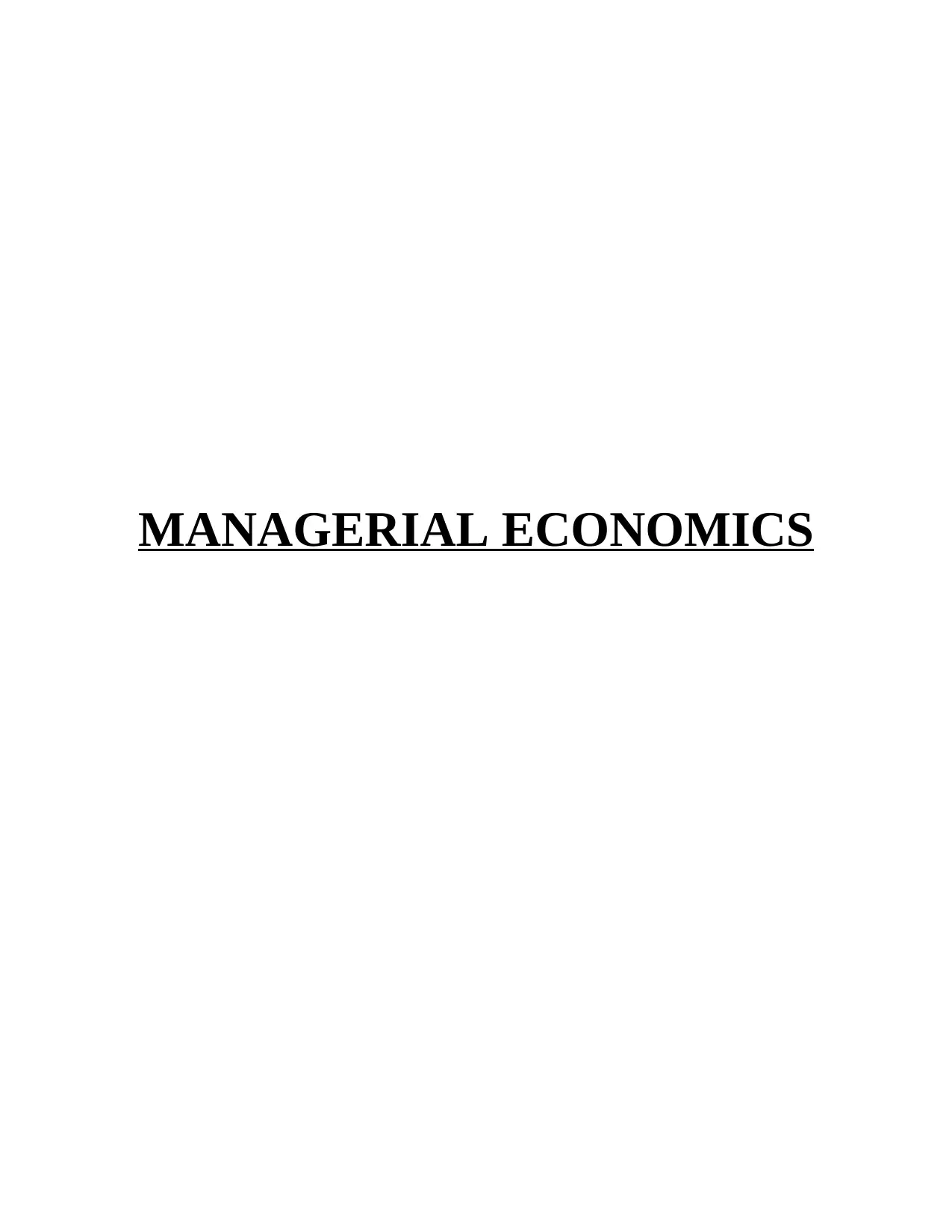
MANAGERIAL ECONOMICS
Secure Best Marks with AI Grader
Need help grading? Try our AI Grader for instant feedback on your assignments.
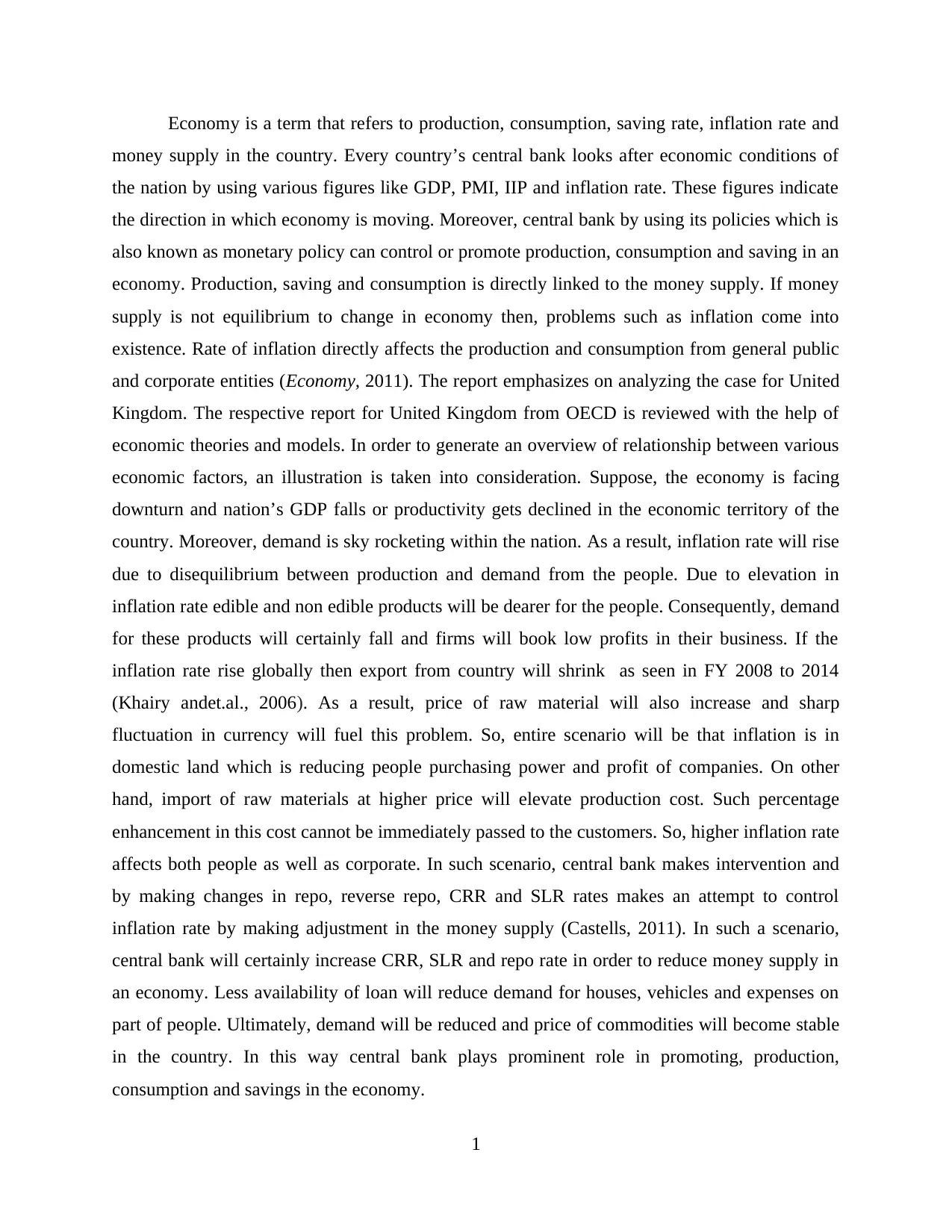
Economy is a term that refers to production, consumption, saving rate, inflation rate and
money supply in the country. Every country’s central bank looks after economic conditions of
the nation by using various figures like GDP, PMI, IIP and inflation rate. These figures indicate
the direction in which economy is moving. Moreover, central bank by using its policies which is
also known as monetary policy can control or promote production, consumption and saving in an
economy. Production, saving and consumption is directly linked to the money supply. If money
supply is not equilibrium to change in economy then, problems such as inflation come into
existence. Rate of inflation directly affects the production and consumption from general public
and corporate entities (Economy, 2011). The report emphasizes on analyzing the case for United
Kingdom. The respective report for United Kingdom from OECD is reviewed with the help of
economic theories and models. In order to generate an overview of relationship between various
economic factors, an illustration is taken into consideration. Suppose, the economy is facing
downturn and nation’s GDP falls or productivity gets declined in the economic territory of the
country. Moreover, demand is sky rocketing within the nation. As a result, inflation rate will rise
due to disequilibrium between production and demand from the people. Due to elevation in
inflation rate edible and non edible products will be dearer for the people. Consequently, demand
for these products will certainly fall and firms will book low profits in their business. If the
inflation rate rise globally then export from country will shrink as seen in FY 2008 to 2014
(Khairy andet.al., 2006). As a result, price of raw material will also increase and sharp
fluctuation in currency will fuel this problem. So, entire scenario will be that inflation is in
domestic land which is reducing people purchasing power and profit of companies. On other
hand, import of raw materials at higher price will elevate production cost. Such percentage
enhancement in this cost cannot be immediately passed to the customers. So, higher inflation rate
affects both people as well as corporate. In such scenario, central bank makes intervention and
by making changes in repo, reverse repo, CRR and SLR rates makes an attempt to control
inflation rate by making adjustment in the money supply (Castells, 2011). In such a scenario,
central bank will certainly increase CRR, SLR and repo rate in order to reduce money supply in
an economy. Less availability of loan will reduce demand for houses, vehicles and expenses on
part of people. Ultimately, demand will be reduced and price of commodities will become stable
in the country. In this way central bank plays prominent role in promoting, production,
consumption and savings in the economy.
1
money supply in the country. Every country’s central bank looks after economic conditions of
the nation by using various figures like GDP, PMI, IIP and inflation rate. These figures indicate
the direction in which economy is moving. Moreover, central bank by using its policies which is
also known as monetary policy can control or promote production, consumption and saving in an
economy. Production, saving and consumption is directly linked to the money supply. If money
supply is not equilibrium to change in economy then, problems such as inflation come into
existence. Rate of inflation directly affects the production and consumption from general public
and corporate entities (Economy, 2011). The report emphasizes on analyzing the case for United
Kingdom. The respective report for United Kingdom from OECD is reviewed with the help of
economic theories and models. In order to generate an overview of relationship between various
economic factors, an illustration is taken into consideration. Suppose, the economy is facing
downturn and nation’s GDP falls or productivity gets declined in the economic territory of the
country. Moreover, demand is sky rocketing within the nation. As a result, inflation rate will rise
due to disequilibrium between production and demand from the people. Due to elevation in
inflation rate edible and non edible products will be dearer for the people. Consequently, demand
for these products will certainly fall and firms will book low profits in their business. If the
inflation rate rise globally then export from country will shrink as seen in FY 2008 to 2014
(Khairy andet.al., 2006). As a result, price of raw material will also increase and sharp
fluctuation in currency will fuel this problem. So, entire scenario will be that inflation is in
domestic land which is reducing people purchasing power and profit of companies. On other
hand, import of raw materials at higher price will elevate production cost. Such percentage
enhancement in this cost cannot be immediately passed to the customers. So, higher inflation rate
affects both people as well as corporate. In such scenario, central bank makes intervention and
by making changes in repo, reverse repo, CRR and SLR rates makes an attempt to control
inflation rate by making adjustment in the money supply (Castells, 2011). In such a scenario,
central bank will certainly increase CRR, SLR and repo rate in order to reduce money supply in
an economy. Less availability of loan will reduce demand for houses, vehicles and expenses on
part of people. Ultimately, demand will be reduced and price of commodities will become stable
in the country. In this way central bank plays prominent role in promoting, production,
consumption and savings in the economy.
1
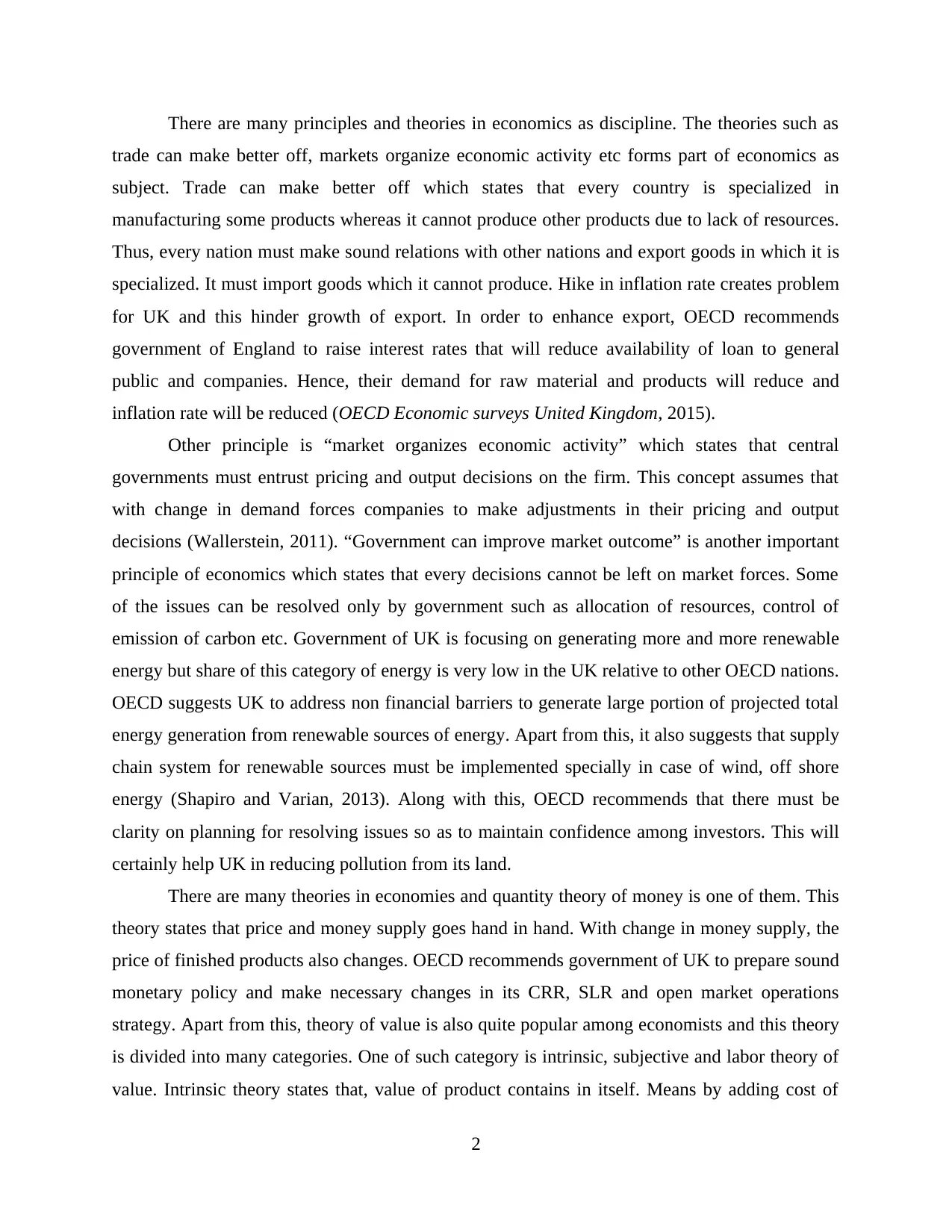
There are many principles and theories in economics as discipline. The theories such as
trade can make better off, markets organize economic activity etc forms part of economics as
subject. Trade can make better off which states that every country is specialized in
manufacturing some products whereas it cannot produce other products due to lack of resources.
Thus, every nation must make sound relations with other nations and export goods in which it is
specialized. It must import goods which it cannot produce. Hike in inflation rate creates problem
for UK and this hinder growth of export. In order to enhance export, OECD recommends
government of England to raise interest rates that will reduce availability of loan to general
public and companies. Hence, their demand for raw material and products will reduce and
inflation rate will be reduced (OECD Economic surveys United Kingdom, 2015).
Other principle is “market organizes economic activity” which states that central
governments must entrust pricing and output decisions on the firm. This concept assumes that
with change in demand forces companies to make adjustments in their pricing and output
decisions (Wallerstein, 2011). “Government can improve market outcome” is another important
principle of economics which states that every decisions cannot be left on market forces. Some
of the issues can be resolved only by government such as allocation of resources, control of
emission of carbon etc. Government of UK is focusing on generating more and more renewable
energy but share of this category of energy is very low in the UK relative to other OECD nations.
OECD suggests UK to address non financial barriers to generate large portion of projected total
energy generation from renewable sources of energy. Apart from this, it also suggests that supply
chain system for renewable sources must be implemented specially in case of wind, off shore
energy (Shapiro and Varian, 2013). Along with this, OECD recommends that there must be
clarity on planning for resolving issues so as to maintain confidence among investors. This will
certainly help UK in reducing pollution from its land.
There are many theories in economies and quantity theory of money is one of them. This
theory states that price and money supply goes hand in hand. With change in money supply, the
price of finished products also changes. OECD recommends government of UK to prepare sound
monetary policy and make necessary changes in its CRR, SLR and open market operations
strategy. Apart from this, theory of value is also quite popular among economists and this theory
is divided into many categories. One of such category is intrinsic, subjective and labor theory of
value. Intrinsic theory states that, value of product contains in itself. Means by adding cost of
2
trade can make better off, markets organize economic activity etc forms part of economics as
subject. Trade can make better off which states that every country is specialized in
manufacturing some products whereas it cannot produce other products due to lack of resources.
Thus, every nation must make sound relations with other nations and export goods in which it is
specialized. It must import goods which it cannot produce. Hike in inflation rate creates problem
for UK and this hinder growth of export. In order to enhance export, OECD recommends
government of England to raise interest rates that will reduce availability of loan to general
public and companies. Hence, their demand for raw material and products will reduce and
inflation rate will be reduced (OECD Economic surveys United Kingdom, 2015).
Other principle is “market organizes economic activity” which states that central
governments must entrust pricing and output decisions on the firm. This concept assumes that
with change in demand forces companies to make adjustments in their pricing and output
decisions (Wallerstein, 2011). “Government can improve market outcome” is another important
principle of economics which states that every decisions cannot be left on market forces. Some
of the issues can be resolved only by government such as allocation of resources, control of
emission of carbon etc. Government of UK is focusing on generating more and more renewable
energy but share of this category of energy is very low in the UK relative to other OECD nations.
OECD suggests UK to address non financial barriers to generate large portion of projected total
energy generation from renewable sources of energy. Apart from this, it also suggests that supply
chain system for renewable sources must be implemented specially in case of wind, off shore
energy (Shapiro and Varian, 2013). Along with this, OECD recommends that there must be
clarity on planning for resolving issues so as to maintain confidence among investors. This will
certainly help UK in reducing pollution from its land.
There are many theories in economies and quantity theory of money is one of them. This
theory states that price and money supply goes hand in hand. With change in money supply, the
price of finished products also changes. OECD recommends government of UK to prepare sound
monetary policy and make necessary changes in its CRR, SLR and open market operations
strategy. Apart from this, theory of value is also quite popular among economists and this theory
is divided into many categories. One of such category is intrinsic, subjective and labor theory of
value. Intrinsic theory states that, value of product contains in itself. Means by adding cost of
2
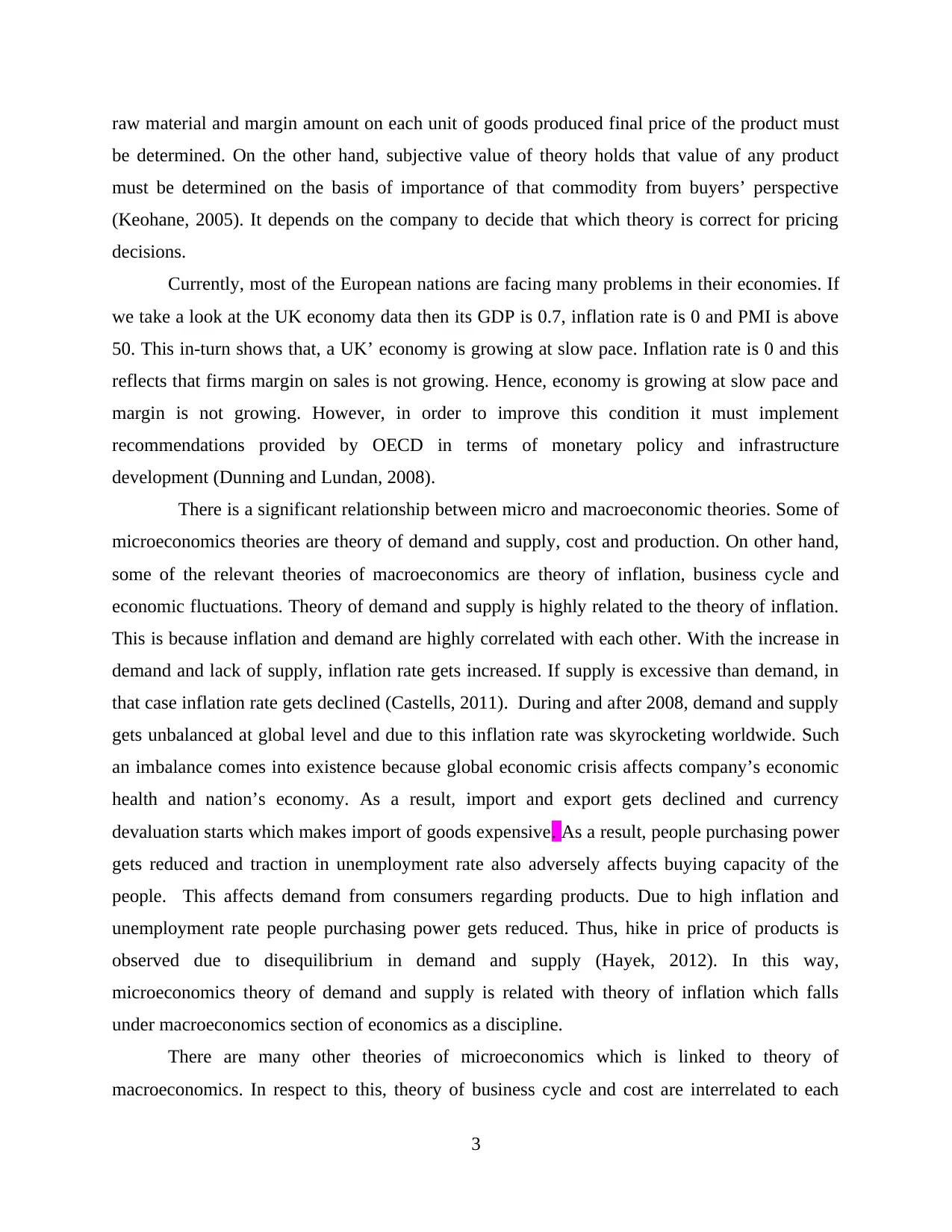
raw material and margin amount on each unit of goods produced final price of the product must
be determined. On the other hand, subjective value of theory holds that value of any product
must be determined on the basis of importance of that commodity from buyers’ perspective
(Keohane, 2005). It depends on the company to decide that which theory is correct for pricing
decisions.
Currently, most of the European nations are facing many problems in their economies. If
we take a look at the UK economy data then its GDP is 0.7, inflation rate is 0 and PMI is above
50. This in-turn shows that, a UK’ economy is growing at slow pace. Inflation rate is 0 and this
reflects that firms margin on sales is not growing. Hence, economy is growing at slow pace and
margin is not growing. However, in order to improve this condition it must implement
recommendations provided by OECD in terms of monetary policy and infrastructure
development (Dunning and Lundan, 2008).
There is a significant relationship between micro and macroeconomic theories. Some of
microeconomics theories are theory of demand and supply, cost and production. On other hand,
some of the relevant theories of macroeconomics are theory of inflation, business cycle and
economic fluctuations. Theory of demand and supply is highly related to the theory of inflation.
This is because inflation and demand are highly correlated with each other. With the increase in
demand and lack of supply, inflation rate gets increased. If supply is excessive than demand, in
that case inflation rate gets declined (Castells, 2011). During and after 2008, demand and supply
gets unbalanced at global level and due to this inflation rate was skyrocketing worldwide. Such
an imbalance comes into existence because global economic crisis affects company’s economic
health and nation’s economy. As a result, import and export gets declined and currency
devaluation starts which makes import of goods expensive. As a result, people purchasing power
gets reduced and traction in unemployment rate also adversely affects buying capacity of the
people. This affects demand from consumers regarding products. Due to high inflation and
unemployment rate people purchasing power gets reduced. Thus, hike in price of products is
observed due to disequilibrium in demand and supply (Hayek, 2012). In this way,
microeconomics theory of demand and supply is related with theory of inflation which falls
under macroeconomics section of economics as a discipline.
There are many other theories of microeconomics which is linked to theory of
macroeconomics. In respect to this, theory of business cycle and cost are interrelated to each
3
be determined. On the other hand, subjective value of theory holds that value of any product
must be determined on the basis of importance of that commodity from buyers’ perspective
(Keohane, 2005). It depends on the company to decide that which theory is correct for pricing
decisions.
Currently, most of the European nations are facing many problems in their economies. If
we take a look at the UK economy data then its GDP is 0.7, inflation rate is 0 and PMI is above
50. This in-turn shows that, a UK’ economy is growing at slow pace. Inflation rate is 0 and this
reflects that firms margin on sales is not growing. Hence, economy is growing at slow pace and
margin is not growing. However, in order to improve this condition it must implement
recommendations provided by OECD in terms of monetary policy and infrastructure
development (Dunning and Lundan, 2008).
There is a significant relationship between micro and macroeconomic theories. Some of
microeconomics theories are theory of demand and supply, cost and production. On other hand,
some of the relevant theories of macroeconomics are theory of inflation, business cycle and
economic fluctuations. Theory of demand and supply is highly related to the theory of inflation.
This is because inflation and demand are highly correlated with each other. With the increase in
demand and lack of supply, inflation rate gets increased. If supply is excessive than demand, in
that case inflation rate gets declined (Castells, 2011). During and after 2008, demand and supply
gets unbalanced at global level and due to this inflation rate was skyrocketing worldwide. Such
an imbalance comes into existence because global economic crisis affects company’s economic
health and nation’s economy. As a result, import and export gets declined and currency
devaluation starts which makes import of goods expensive. As a result, people purchasing power
gets reduced and traction in unemployment rate also adversely affects buying capacity of the
people. This affects demand from consumers regarding products. Due to high inflation and
unemployment rate people purchasing power gets reduced. Thus, hike in price of products is
observed due to disequilibrium in demand and supply (Hayek, 2012). In this way,
microeconomics theory of demand and supply is related with theory of inflation which falls
under macroeconomics section of economics as a discipline.
There are many other theories of microeconomics which is linked to theory of
macroeconomics. In respect to this, theory of business cycle and cost are interrelated to each
3
Secure Best Marks with AI Grader
Need help grading? Try our AI Grader for instant feedback on your assignments.
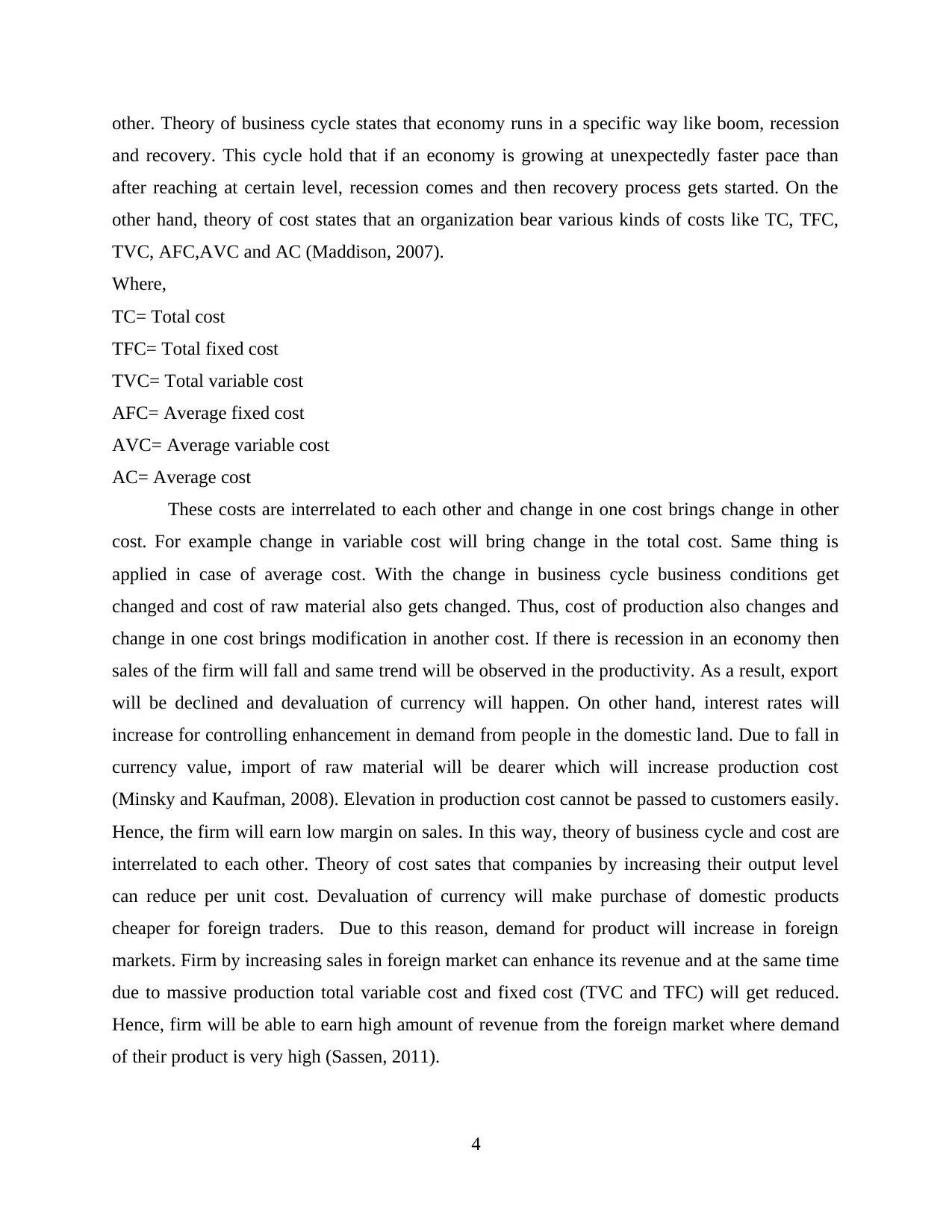
other. Theory of business cycle states that economy runs in a specific way like boom, recession
and recovery. This cycle hold that if an economy is growing at unexpectedly faster pace than
after reaching at certain level, recession comes and then recovery process gets started. On the
other hand, theory of cost states that an organization bear various kinds of costs like TC, TFC,
TVC, AFC,AVC and AC (Maddison, 2007).
Where,
TC= Total cost
TFC= Total fixed cost
TVC= Total variable cost
AFC= Average fixed cost
AVC= Average variable cost
AC= Average cost
These costs are interrelated to each other and change in one cost brings change in other
cost. For example change in variable cost will bring change in the total cost. Same thing is
applied in case of average cost. With the change in business cycle business conditions get
changed and cost of raw material also gets changed. Thus, cost of production also changes and
change in one cost brings modification in another cost. If there is recession in an economy then
sales of the firm will fall and same trend will be observed in the productivity. As a result, export
will be declined and devaluation of currency will happen. On other hand, interest rates will
increase for controlling enhancement in demand from people in the domestic land. Due to fall in
currency value, import of raw material will be dearer which will increase production cost
(Minsky and Kaufman, 2008). Elevation in production cost cannot be passed to customers easily.
Hence, the firm will earn low margin on sales. In this way, theory of business cycle and cost are
interrelated to each other. Theory of cost sates that companies by increasing their output level
can reduce per unit cost. Devaluation of currency will make purchase of domestic products
cheaper for foreign traders. Due to this reason, demand for product will increase in foreign
markets. Firm by increasing sales in foreign market can enhance its revenue and at the same time
due to massive production total variable cost and fixed cost (TVC and TFC) will get reduced.
Hence, firm will be able to earn high amount of revenue from the foreign market where demand
of their product is very high (Sassen, 2011).
4
and recovery. This cycle hold that if an economy is growing at unexpectedly faster pace than
after reaching at certain level, recession comes and then recovery process gets started. On the
other hand, theory of cost states that an organization bear various kinds of costs like TC, TFC,
TVC, AFC,AVC and AC (Maddison, 2007).
Where,
TC= Total cost
TFC= Total fixed cost
TVC= Total variable cost
AFC= Average fixed cost
AVC= Average variable cost
AC= Average cost
These costs are interrelated to each other and change in one cost brings change in other
cost. For example change in variable cost will bring change in the total cost. Same thing is
applied in case of average cost. With the change in business cycle business conditions get
changed and cost of raw material also gets changed. Thus, cost of production also changes and
change in one cost brings modification in another cost. If there is recession in an economy then
sales of the firm will fall and same trend will be observed in the productivity. As a result, export
will be declined and devaluation of currency will happen. On other hand, interest rates will
increase for controlling enhancement in demand from people in the domestic land. Due to fall in
currency value, import of raw material will be dearer which will increase production cost
(Minsky and Kaufman, 2008). Elevation in production cost cannot be passed to customers easily.
Hence, the firm will earn low margin on sales. In this way, theory of business cycle and cost are
interrelated to each other. Theory of cost sates that companies by increasing their output level
can reduce per unit cost. Devaluation of currency will make purchase of domestic products
cheaper for foreign traders. Due to this reason, demand for product will increase in foreign
markets. Firm by increasing sales in foreign market can enhance its revenue and at the same time
due to massive production total variable cost and fixed cost (TVC and TFC) will get reduced.
Hence, firm will be able to earn high amount of revenue from the foreign market where demand
of their product is very high (Sassen, 2011).
4
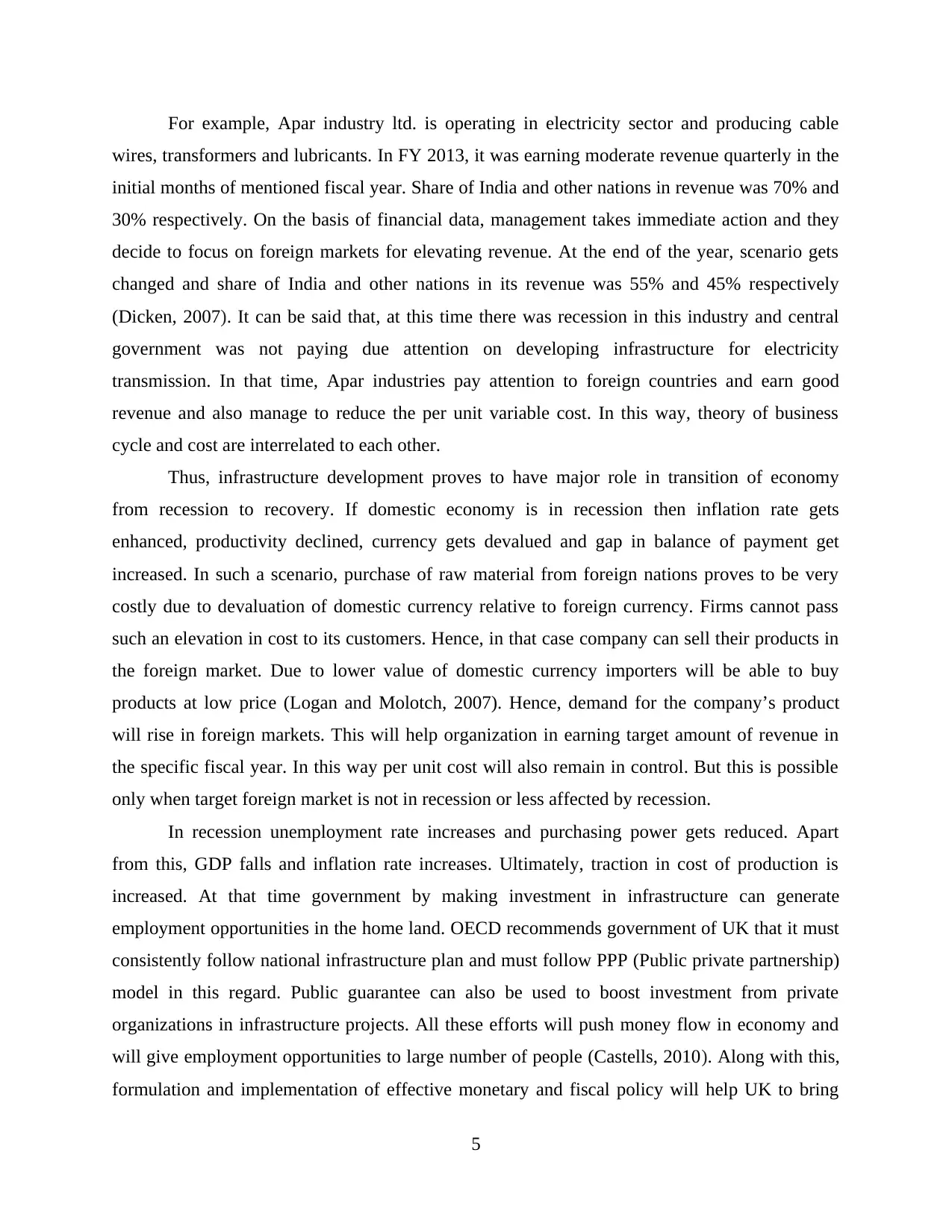
For example, Apar industry ltd. is operating in electricity sector and producing cable
wires, transformers and lubricants. In FY 2013, it was earning moderate revenue quarterly in the
initial months of mentioned fiscal year. Share of India and other nations in revenue was 70% and
30% respectively. On the basis of financial data, management takes immediate action and they
decide to focus on foreign markets for elevating revenue. At the end of the year, scenario gets
changed and share of India and other nations in its revenue was 55% and 45% respectively
(Dicken, 2007). It can be said that, at this time there was recession in this industry and central
government was not paying due attention on developing infrastructure for electricity
transmission. In that time, Apar industries pay attention to foreign countries and earn good
revenue and also manage to reduce the per unit variable cost. In this way, theory of business
cycle and cost are interrelated to each other.
Thus, infrastructure development proves to have major role in transition of economy
from recession to recovery. If domestic economy is in recession then inflation rate gets
enhanced, productivity declined, currency gets devalued and gap in balance of payment get
increased. In such a scenario, purchase of raw material from foreign nations proves to be very
costly due to devaluation of domestic currency relative to foreign currency. Firms cannot pass
such an elevation in cost to its customers. Hence, in that case company can sell their products in
the foreign market. Due to lower value of domestic currency importers will be able to buy
products at low price (Logan and Molotch, 2007). Hence, demand for the company’s product
will rise in foreign markets. This will help organization in earning target amount of revenue in
the specific fiscal year. In this way per unit cost will also remain in control. But this is possible
only when target foreign market is not in recession or less affected by recession.
In recession unemployment rate increases and purchasing power gets reduced. Apart
from this, GDP falls and inflation rate increases. Ultimately, traction in cost of production is
increased. At that time government by making investment in infrastructure can generate
employment opportunities in the home land. OECD recommends government of UK that it must
consistently follow national infrastructure plan and must follow PPP (Public private partnership)
model in this regard. Public guarantee can also be used to boost investment from private
organizations in infrastructure projects. All these efforts will push money flow in economy and
will give employment opportunities to large number of people (Castells, 2010). Along with this,
formulation and implementation of effective monetary and fiscal policy will help UK to bring
5
wires, transformers and lubricants. In FY 2013, it was earning moderate revenue quarterly in the
initial months of mentioned fiscal year. Share of India and other nations in revenue was 70% and
30% respectively. On the basis of financial data, management takes immediate action and they
decide to focus on foreign markets for elevating revenue. At the end of the year, scenario gets
changed and share of India and other nations in its revenue was 55% and 45% respectively
(Dicken, 2007). It can be said that, at this time there was recession in this industry and central
government was not paying due attention on developing infrastructure for electricity
transmission. In that time, Apar industries pay attention to foreign countries and earn good
revenue and also manage to reduce the per unit variable cost. In this way, theory of business
cycle and cost are interrelated to each other.
Thus, infrastructure development proves to have major role in transition of economy
from recession to recovery. If domestic economy is in recession then inflation rate gets
enhanced, productivity declined, currency gets devalued and gap in balance of payment get
increased. In such a scenario, purchase of raw material from foreign nations proves to be very
costly due to devaluation of domestic currency relative to foreign currency. Firms cannot pass
such an elevation in cost to its customers. Hence, in that case company can sell their products in
the foreign market. Due to lower value of domestic currency importers will be able to buy
products at low price (Logan and Molotch, 2007). Hence, demand for the company’s product
will rise in foreign markets. This will help organization in earning target amount of revenue in
the specific fiscal year. In this way per unit cost will also remain in control. But this is possible
only when target foreign market is not in recession or less affected by recession.
In recession unemployment rate increases and purchasing power gets reduced. Apart
from this, GDP falls and inflation rate increases. Ultimately, traction in cost of production is
increased. At that time government by making investment in infrastructure can generate
employment opportunities in the home land. OECD recommends government of UK that it must
consistently follow national infrastructure plan and must follow PPP (Public private partnership)
model in this regard. Public guarantee can also be used to boost investment from private
organizations in infrastructure projects. All these efforts will push money flow in economy and
will give employment opportunities to large number of people (Castells, 2010). Along with this,
formulation and implementation of effective monetary and fiscal policy will help UK to bring
5
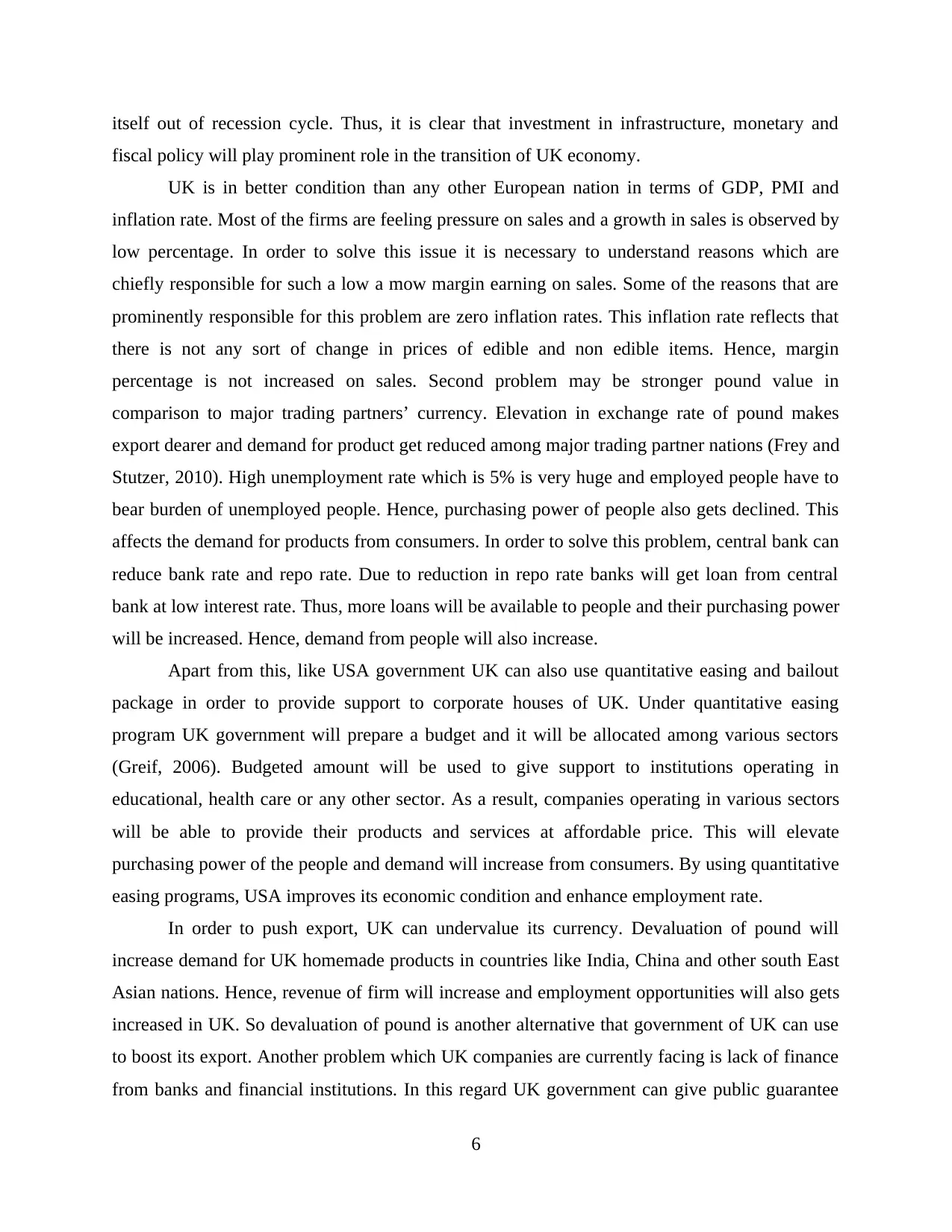
itself out of recession cycle. Thus, it is clear that investment in infrastructure, monetary and
fiscal policy will play prominent role in the transition of UK economy.
UK is in better condition than any other European nation in terms of GDP, PMI and
inflation rate. Most of the firms are feeling pressure on sales and a growth in sales is observed by
low percentage. In order to solve this issue it is necessary to understand reasons which are
chiefly responsible for such a low a mow margin earning on sales. Some of the reasons that are
prominently responsible for this problem are zero inflation rates. This inflation rate reflects that
there is not any sort of change in prices of edible and non edible items. Hence, margin
percentage is not increased on sales. Second problem may be stronger pound value in
comparison to major trading partners’ currency. Elevation in exchange rate of pound makes
export dearer and demand for product get reduced among major trading partner nations (Frey and
Stutzer, 2010). High unemployment rate which is 5% is very huge and employed people have to
bear burden of unemployed people. Hence, purchasing power of people also gets declined. This
affects the demand for products from consumers. In order to solve this problem, central bank can
reduce bank rate and repo rate. Due to reduction in repo rate banks will get loan from central
bank at low interest rate. Thus, more loans will be available to people and their purchasing power
will be increased. Hence, demand from people will also increase.
Apart from this, like USA government UK can also use quantitative easing and bailout
package in order to provide support to corporate houses of UK. Under quantitative easing
program UK government will prepare a budget and it will be allocated among various sectors
(Greif, 2006). Budgeted amount will be used to give support to institutions operating in
educational, health care or any other sector. As a result, companies operating in various sectors
will be able to provide their products and services at affordable price. This will elevate
purchasing power of the people and demand will increase from consumers. By using quantitative
easing programs, USA improves its economic condition and enhance employment rate.
In order to push export, UK can undervalue its currency. Devaluation of pound will
increase demand for UK homemade products in countries like India, China and other south East
Asian nations. Hence, revenue of firm will increase and employment opportunities will also gets
increased in UK. So devaluation of pound is another alternative that government of UK can use
to boost its export. Another problem which UK companies are currently facing is lack of finance
from banks and financial institutions. In this regard UK government can give public guarantee
6
fiscal policy will play prominent role in the transition of UK economy.
UK is in better condition than any other European nation in terms of GDP, PMI and
inflation rate. Most of the firms are feeling pressure on sales and a growth in sales is observed by
low percentage. In order to solve this issue it is necessary to understand reasons which are
chiefly responsible for such a low a mow margin earning on sales. Some of the reasons that are
prominently responsible for this problem are zero inflation rates. This inflation rate reflects that
there is not any sort of change in prices of edible and non edible items. Hence, margin
percentage is not increased on sales. Second problem may be stronger pound value in
comparison to major trading partners’ currency. Elevation in exchange rate of pound makes
export dearer and demand for product get reduced among major trading partner nations (Frey and
Stutzer, 2010). High unemployment rate which is 5% is very huge and employed people have to
bear burden of unemployed people. Hence, purchasing power of people also gets declined. This
affects the demand for products from consumers. In order to solve this problem, central bank can
reduce bank rate and repo rate. Due to reduction in repo rate banks will get loan from central
bank at low interest rate. Thus, more loans will be available to people and their purchasing power
will be increased. Hence, demand from people will also increase.
Apart from this, like USA government UK can also use quantitative easing and bailout
package in order to provide support to corporate houses of UK. Under quantitative easing
program UK government will prepare a budget and it will be allocated among various sectors
(Greif, 2006). Budgeted amount will be used to give support to institutions operating in
educational, health care or any other sector. As a result, companies operating in various sectors
will be able to provide their products and services at affordable price. This will elevate
purchasing power of the people and demand will increase from consumers. By using quantitative
easing programs, USA improves its economic condition and enhance employment rate.
In order to push export, UK can undervalue its currency. Devaluation of pound will
increase demand for UK homemade products in countries like India, China and other south East
Asian nations. Hence, revenue of firm will increase and employment opportunities will also gets
increased in UK. So devaluation of pound is another alternative that government of UK can use
to boost its export. Another problem which UK companies are currently facing is lack of finance
from banks and financial institutions. In this regard UK government can give public guarantee
6
Paraphrase This Document
Need a fresh take? Get an instant paraphrase of this document with our AI Paraphraser
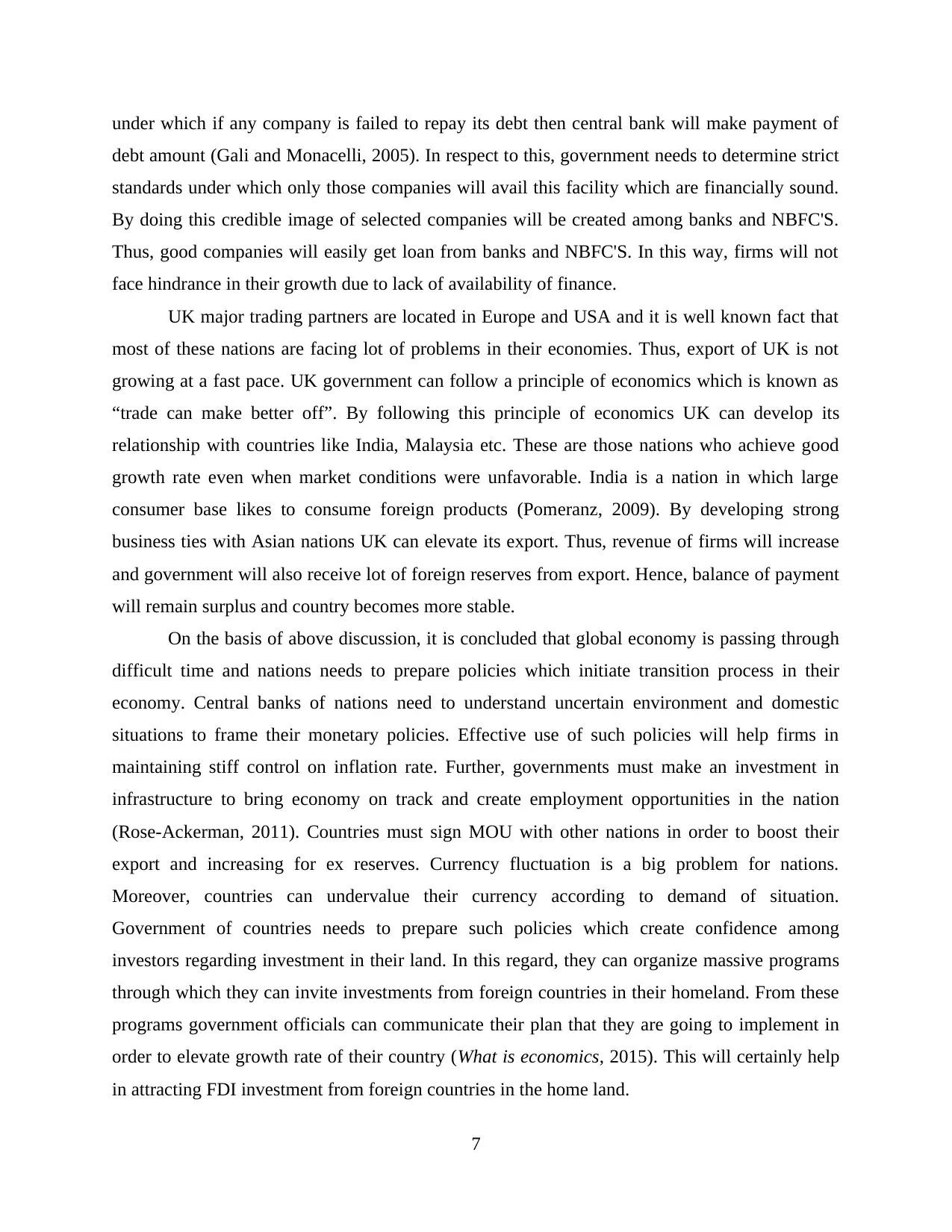
under which if any company is failed to repay its debt then central bank will make payment of
debt amount (Gali and Monacelli, 2005). In respect to this, government needs to determine strict
standards under which only those companies will avail this facility which are financially sound.
By doing this credible image of selected companies will be created among banks and NBFC'S.
Thus, good companies will easily get loan from banks and NBFC'S. In this way, firms will not
face hindrance in their growth due to lack of availability of finance.
UK major trading partners are located in Europe and USA and it is well known fact that
most of these nations are facing lot of problems in their economies. Thus, export of UK is not
growing at a fast pace. UK government can follow a principle of economics which is known as
“trade can make better off”. By following this principle of economics UK can develop its
relationship with countries like India, Malaysia etc. These are those nations who achieve good
growth rate even when market conditions were unfavorable. India is a nation in which large
consumer base likes to consume foreign products (Pomeranz, 2009). By developing strong
business ties with Asian nations UK can elevate its export. Thus, revenue of firms will increase
and government will also receive lot of foreign reserves from export. Hence, balance of payment
will remain surplus and country becomes more stable.
On the basis of above discussion, it is concluded that global economy is passing through
difficult time and nations needs to prepare policies which initiate transition process in their
economy. Central banks of nations need to understand uncertain environment and domestic
situations to frame their monetary policies. Effective use of such policies will help firms in
maintaining stiff control on inflation rate. Further, governments must make an investment in
infrastructure to bring economy on track and create employment opportunities in the nation
(Rose-Ackerman, 2011). Countries must sign MOU with other nations in order to boost their
export and increasing for ex reserves. Currency fluctuation is a big problem for nations.
Moreover, countries can undervalue their currency according to demand of situation.
Government of countries needs to prepare such policies which create confidence among
investors regarding investment in their land. In this regard, they can organize massive programs
through which they can invite investments from foreign countries in their homeland. From these
programs government officials can communicate their plan that they are going to implement in
order to elevate growth rate of their country (What is economics, 2015). This will certainly help
in attracting FDI investment from foreign countries in the home land.
7
debt amount (Gali and Monacelli, 2005). In respect to this, government needs to determine strict
standards under which only those companies will avail this facility which are financially sound.
By doing this credible image of selected companies will be created among banks and NBFC'S.
Thus, good companies will easily get loan from banks and NBFC'S. In this way, firms will not
face hindrance in their growth due to lack of availability of finance.
UK major trading partners are located in Europe and USA and it is well known fact that
most of these nations are facing lot of problems in their economies. Thus, export of UK is not
growing at a fast pace. UK government can follow a principle of economics which is known as
“trade can make better off”. By following this principle of economics UK can develop its
relationship with countries like India, Malaysia etc. These are those nations who achieve good
growth rate even when market conditions were unfavorable. India is a nation in which large
consumer base likes to consume foreign products (Pomeranz, 2009). By developing strong
business ties with Asian nations UK can elevate its export. Thus, revenue of firms will increase
and government will also receive lot of foreign reserves from export. Hence, balance of payment
will remain surplus and country becomes more stable.
On the basis of above discussion, it is concluded that global economy is passing through
difficult time and nations needs to prepare policies which initiate transition process in their
economy. Central banks of nations need to understand uncertain environment and domestic
situations to frame their monetary policies. Effective use of such policies will help firms in
maintaining stiff control on inflation rate. Further, governments must make an investment in
infrastructure to bring economy on track and create employment opportunities in the nation
(Rose-Ackerman, 2011). Countries must sign MOU with other nations in order to boost their
export and increasing for ex reserves. Currency fluctuation is a big problem for nations.
Moreover, countries can undervalue their currency according to demand of situation.
Government of countries needs to prepare such policies which create confidence among
investors regarding investment in their land. In this regard, they can organize massive programs
through which they can invite investments from foreign countries in their homeland. From these
programs government officials can communicate their plan that they are going to implement in
order to elevate growth rate of their country (What is economics, 2015). This will certainly help
in attracting FDI investment from foreign countries in the home land.
7
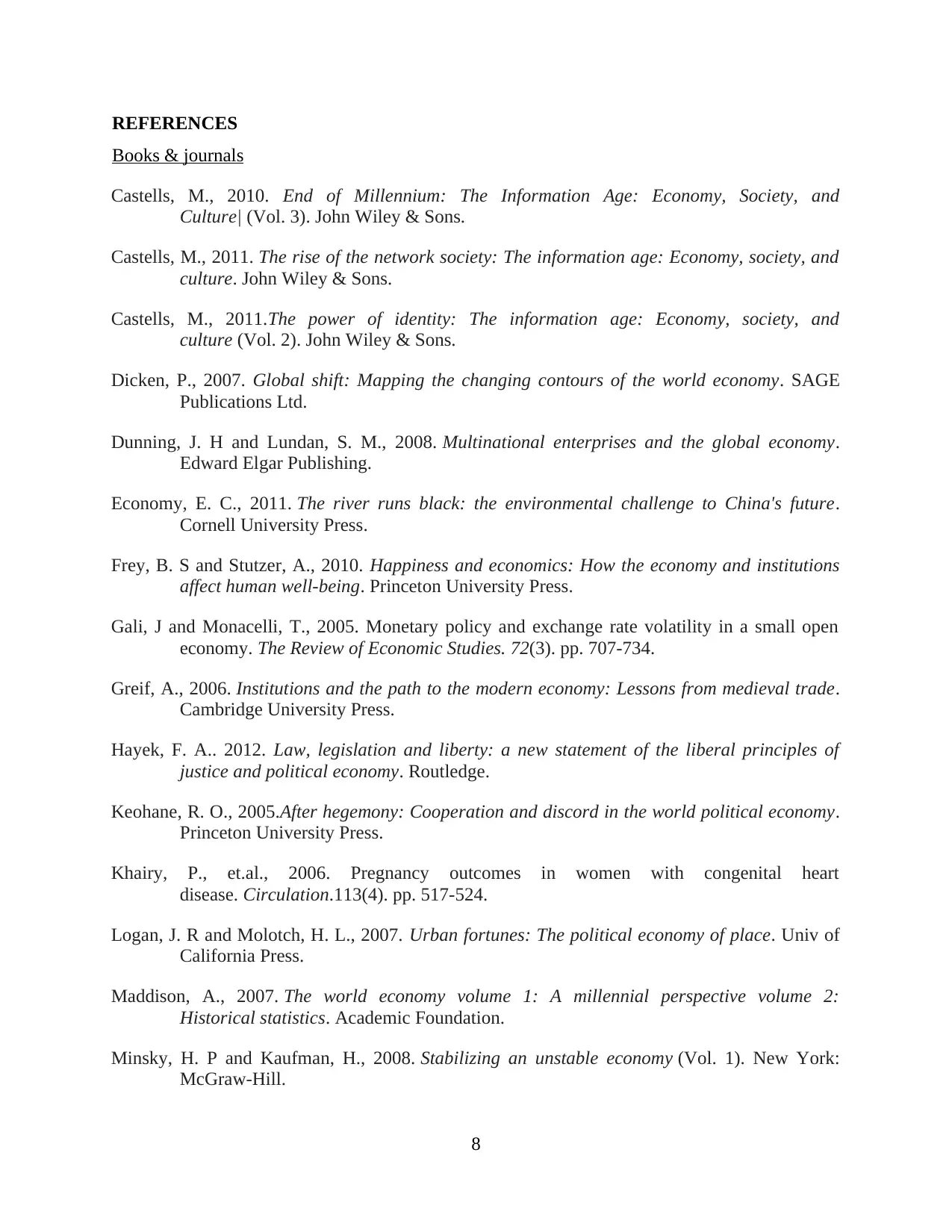
REFERENCES
Books & journals
Castells, M., 2010. End of Millennium: The Information Age: Economy, Society, and
Culture| (Vol. 3). John Wiley & Sons.
Castells, M., 2011. The rise of the network society: The information age: Economy, society, and
culture. John Wiley & Sons.
Castells, M., 2011.The power of identity: The information age: Economy, society, and
culture (Vol. 2). John Wiley & Sons.
Dicken, P., 2007. Global shift: Mapping the changing contours of the world economy. SAGE
Publications Ltd.
Dunning, J. H and Lundan, S. M., 2008. Multinational enterprises and the global economy.
Edward Elgar Publishing.
Economy, E. C., 2011. The river runs black: the environmental challenge to China's future.
Cornell University Press.
Frey, B. S and Stutzer, A., 2010. Happiness and economics: How the economy and institutions
affect human well-being. Princeton University Press.
Gali, J and Monacelli, T., 2005. Monetary policy and exchange rate volatility in a small open
economy. The Review of Economic Studies. 72(3). pp. 707-734.
Greif, A., 2006. Institutions and the path to the modern economy: Lessons from medieval trade.
Cambridge University Press.
Hayek, F. A.. 2012. Law, legislation and liberty: a new statement of the liberal principles of
justice and political economy. Routledge.
Keohane, R. O., 2005.After hegemony: Cooperation and discord in the world political economy.
Princeton University Press.
Khairy, P., et.al., 2006. Pregnancy outcomes in women with congenital heart
disease. Circulation.113(4). pp. 517-524.
Logan, J. R and Molotch, H. L., 2007. Urban fortunes: The political economy of place. Univ of
California Press.
Maddison, A., 2007. The world economy volume 1: A millennial perspective volume 2:
Historical statistics. Academic Foundation.
Minsky, H. P and Kaufman, H., 2008. Stabilizing an unstable economy (Vol. 1). New York:
McGraw-Hill.
8
Books & journals
Castells, M., 2010. End of Millennium: The Information Age: Economy, Society, and
Culture| (Vol. 3). John Wiley & Sons.
Castells, M., 2011. The rise of the network society: The information age: Economy, society, and
culture. John Wiley & Sons.
Castells, M., 2011.The power of identity: The information age: Economy, society, and
culture (Vol. 2). John Wiley & Sons.
Dicken, P., 2007. Global shift: Mapping the changing contours of the world economy. SAGE
Publications Ltd.
Dunning, J. H and Lundan, S. M., 2008. Multinational enterprises and the global economy.
Edward Elgar Publishing.
Economy, E. C., 2011. The river runs black: the environmental challenge to China's future.
Cornell University Press.
Frey, B. S and Stutzer, A., 2010. Happiness and economics: How the economy and institutions
affect human well-being. Princeton University Press.
Gali, J and Monacelli, T., 2005. Monetary policy and exchange rate volatility in a small open
economy. The Review of Economic Studies. 72(3). pp. 707-734.
Greif, A., 2006. Institutions and the path to the modern economy: Lessons from medieval trade.
Cambridge University Press.
Hayek, F. A.. 2012. Law, legislation and liberty: a new statement of the liberal principles of
justice and political economy. Routledge.
Keohane, R. O., 2005.After hegemony: Cooperation and discord in the world political economy.
Princeton University Press.
Khairy, P., et.al., 2006. Pregnancy outcomes in women with congenital heart
disease. Circulation.113(4). pp. 517-524.
Logan, J. R and Molotch, H. L., 2007. Urban fortunes: The political economy of place. Univ of
California Press.
Maddison, A., 2007. The world economy volume 1: A millennial perspective volume 2:
Historical statistics. Academic Foundation.
Minsky, H. P and Kaufman, H., 2008. Stabilizing an unstable economy (Vol. 1). New York:
McGraw-Hill.
8
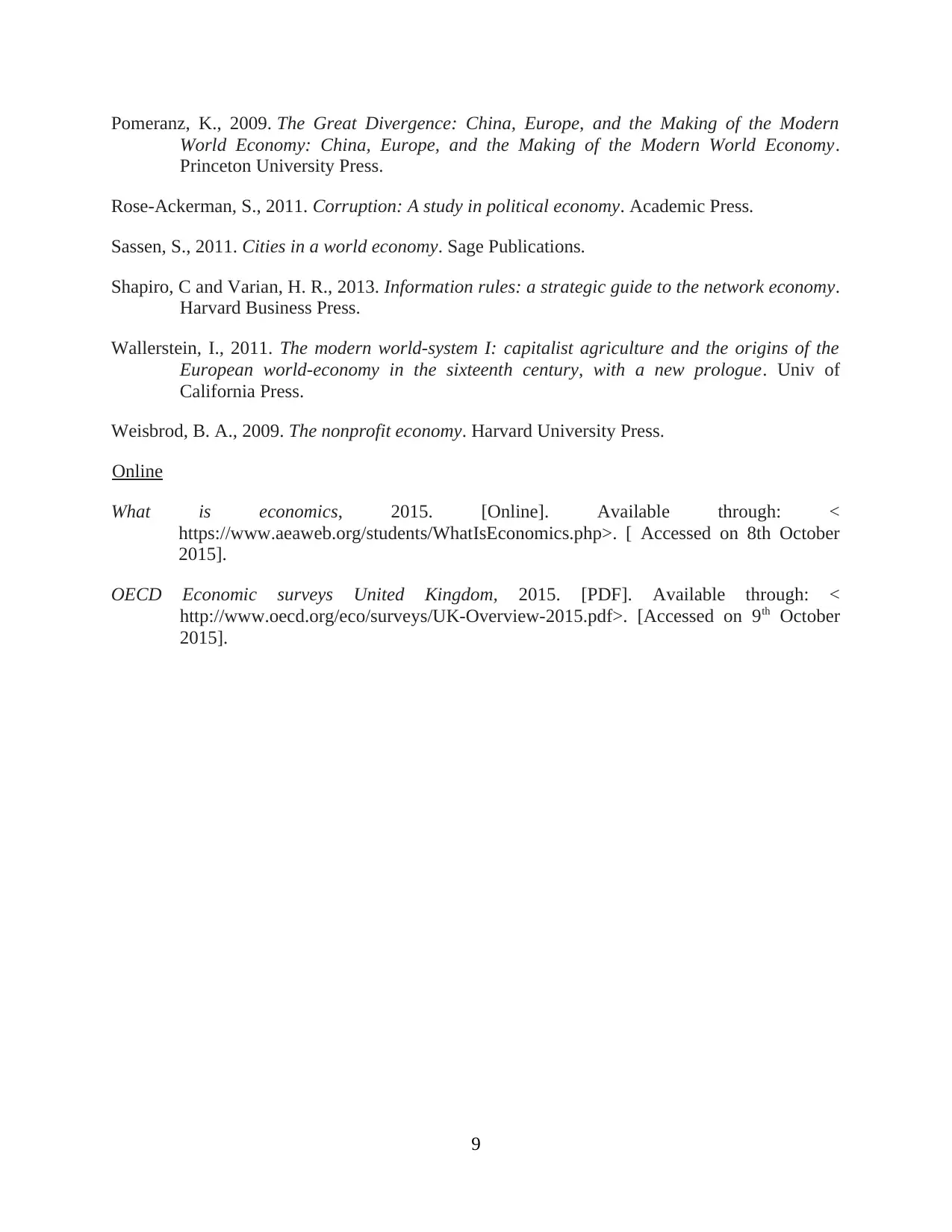
Pomeranz, K., 2009. The Great Divergence: China, Europe, and the Making of the Modern
World Economy: China, Europe, and the Making of the Modern World Economy.
Princeton University Press.
Rose-Ackerman, S., 2011. Corruption: A study in political economy. Academic Press.
Sassen, S., 2011. Cities in a world economy. Sage Publications.
Shapiro, C and Varian, H. R., 2013. Information rules: a strategic guide to the network economy.
Harvard Business Press.
Wallerstein, I., 2011. The modern world-system I: capitalist agriculture and the origins of the
European world-economy in the sixteenth century, with a new prologue. Univ of
California Press.
Weisbrod, B. A., 2009. The nonprofit economy. Harvard University Press.
Online
What is economics, 2015. [Online]. Available through: <
https://www.aeaweb.org/students/WhatIsEconomics.php>. [ Accessed on 8th October
2015].
OECD Economic surveys United Kingdom, 2015. [PDF]. Available through: <
http://www.oecd.org/eco/surveys/UK-Overview-2015.pdf>. [Accessed on 9th October
2015].
9
World Economy: China, Europe, and the Making of the Modern World Economy.
Princeton University Press.
Rose-Ackerman, S., 2011. Corruption: A study in political economy. Academic Press.
Sassen, S., 2011. Cities in a world economy. Sage Publications.
Shapiro, C and Varian, H. R., 2013. Information rules: a strategic guide to the network economy.
Harvard Business Press.
Wallerstein, I., 2011. The modern world-system I: capitalist agriculture and the origins of the
European world-economy in the sixteenth century, with a new prologue. Univ of
California Press.
Weisbrod, B. A., 2009. The nonprofit economy. Harvard University Press.
Online
What is economics, 2015. [Online]. Available through: <
https://www.aeaweb.org/students/WhatIsEconomics.php>. [ Accessed on 8th October
2015].
OECD Economic surveys United Kingdom, 2015. [PDF]. Available through: <
http://www.oecd.org/eco/surveys/UK-Overview-2015.pdf>. [Accessed on 9th October
2015].
9
1 out of 10
Related Documents
Your All-in-One AI-Powered Toolkit for Academic Success.
+13062052269
info@desklib.com
Available 24*7 on WhatsApp / Email
![[object Object]](/_next/static/media/star-bottom.7253800d.svg)
Unlock your academic potential
© 2024 | Zucol Services PVT LTD | All rights reserved.




